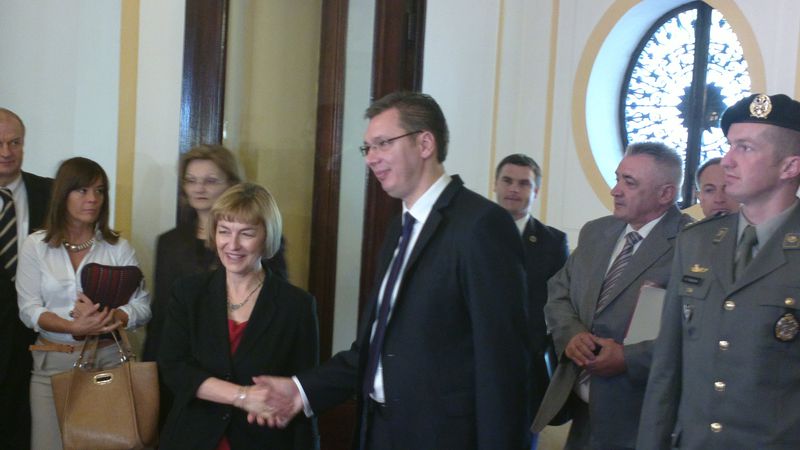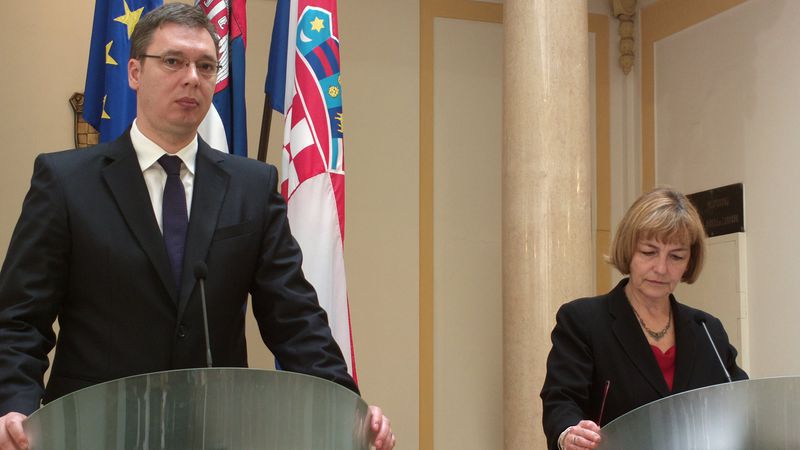Less Emotions and a Lot of Pragmatism Serbia Wants in Relations with Croatia
Adelina Marini, May 2, 2013
Changes in Serbia are one of the rare cases of which it could be said that EU does wonders. The government, which caused widespread fears in the international community and most of all in Europe because of its proximity to the regime that led to bloody wars in Europe in the end of the 20th century, has signed not just an agreement for normalisation of relations with the break away province of Kosovo, but it is on its way to normalise Serbia itself - to turn it toward its "strategic goal" - membership in EU and toward normal relations with the neighbours. And although the fear whether those are Serbia's genuine intentions or whether the society will accept this new path and most of all whether the country will stick to the achieved agreements still is huge as in the region so in Europe, the change in tone and the way of speaking of Serbian high officials is significant.
The alternative is a North Korea of Europe
Last Friday when Serbia's Parliament was debating on the concluded earlier Brussels agreement for the normalisation of relations with Kosovo, Prime Minister Ivica Dacic said the alternative to Serbia's European development was turning it into a North Korea in Europe. Strong words, which he conveyed with confidence, moreover that while Serbia was deliberating on whether to accept the previous version of the agreement or not, Mr Dacic, the former spokesman of Slobodan Milosevic, explained that if Serbia did not agree with Kosovo it would be isolated by the entire world, the economy would sink even more and the chances of salvation would be reduced to zero. Ivica Dacic, who emerged as the big winner in last year's elections in Serbia, is a leader of the Serbian Socialist Party and in spite of his past he seems the man who in the strongest way and not only in words fights for the shift of his country's direction toward Europe.
For this reason, the rapporteur on Serbia in the European Parliament, the Slovene Jelko Kacin (ALDE), called Mr Dacic "the Nixon of the Balkans" because of the significance the signing of the agreement with Kosovo has for the entire region. Only a year ago, former President Boris Tadic was figuring out any possible and impossible arguments not to participate in international forums because of Kosovo's attendance. Today, we have already had ten meetings at the highest level - between the two prime ministers, between the two presidents - and the dialogue is not only on, but it has went far, Mr Kacin explains in an interview for the Croatian daily Vecernji list.
His first deputy and minister of defence, however, Alexander Vucic, was more reserved and often expressed his dissatisfaction with what Serbia was forced to do. Vucic is the right hand of President Tomislav Nikolic, one-time close ally to the Serbian radicals. Vucic broadly explained in media what a tough choice Serbia was facing and that whatever agreement was reached it would not be good for Serbia. He also said that no matter how that hurt, it was the right path for Serbia. Vucic is the leader of the Serbian Progressive Party and is a very influential person in the country.
Where is Croatia?
During that same debate in the Skupstina last Friday, Premier Dacic asked a very important question - and where is Croatia today? And he answered - today Croatia is at the door of EU membership. And where are we, Ivica Dacic asked. The main requirement the EU put forward to Serbia was to normalise its relations with Kosovo. Another important condition was the country to improve its relations with the neighbours. This was not a requirement for Serbia only, but for Croatia as well. After the relations between the two countries cooled significantly after the elections in Serbia last year and after the acquitting sentences by The Hague tribunal for the Croatian generals Gotovina and Markac, since the beginning of the year there have been efforts by both sides for warming. The foreign minsters met for the first time officially in Zagreb in the beginning of the year, although they met before on several occasions in the margins of international formats.
 There was also a meeting between Prime Ministers Dacic and Milanovic in Belgrade. In Zagreb also came Alexander Vucic, whose visit his Croatian opposite number Vesna Pusic defined as very important for the development of relations with Serbia. The last barrier before durable warming remains a meeting between the presidents of the two countries - Ivo Josipovic and Tomislav Nikolic. The Croatian head of state refuses to meet his Serbian counterpart because of his remark regarding the biggest wound from Croatia's war for independence - Vukovar. There are also unclear things in the interview which President Nikolic recently gave for the Bosnian federal TV and in which he apologises for the crimes committed on the territory of former Yugoslavia, but expresses reserves regarding operation "Storm" - the Croatian military operation for the liberation of Croatian towns occupied by Serbia. Tomislav Nikolic is invited to attend the celebrations on the occasion of Croatia's accession in the EU on July 1st. Deputy Prime Minister Vucic hoped Nikolic would attend. It will be essential to find out whether if he came a meeting would be set up with President Josipovic.
There was also a meeting between Prime Ministers Dacic and Milanovic in Belgrade. In Zagreb also came Alexander Vucic, whose visit his Croatian opposite number Vesna Pusic defined as very important for the development of relations with Serbia. The last barrier before durable warming remains a meeting between the presidents of the two countries - Ivo Josipovic and Tomislav Nikolic. The Croatian head of state refuses to meet his Serbian counterpart because of his remark regarding the biggest wound from Croatia's war for independence - Vukovar. There are also unclear things in the interview which President Nikolic recently gave for the Bosnian federal TV and in which he apologises for the crimes committed on the territory of former Yugoslavia, but expresses reserves regarding operation "Storm" - the Croatian military operation for the liberation of Croatian towns occupied by Serbia. Tomislav Nikolic is invited to attend the celebrations on the occasion of Croatia's accession in the EU on July 1st. Deputy Prime Minister Vucic hoped Nikolic would attend. It will be essential to find out whether if he came a meeting would be set up with President Josipovic.
Nevertheless, it has to be noted that in very short terms Serbia demonstrated a significant change. During his visit in Croatia on Monday, Alexander Vucic made it clear that at that stage Serbia preferred to upgrade its relations with Croatia without emotions, on the basis of pragmatism and realism. Serbia and Croatia are key countries for the future of the region, he said. Let's turn to the future and for now not to touch the past. It will suffice to say that we have different visions about it, he added, thus supporting General Ante Gotovina's appeal. During his first speech after his return as a national hero in Zagreb, Ante Gotovina said that it was time the country to turn to the future.
The most immediate problems before Serbia and Croatia are the development of their economic relations. It is necessary all the existing obstacles to be removed and the two countries to seek European funding for trans-border projects. And regarding bilateral issues stemming from the past, they will be solved one by one, pragmatically, was the message of the meeting. For Croatia, a first issue on the list is gathering information about disappeared persons during the war. Recently, with the cooperation of Serbia, a mass grave was discovered in Sotin, near Vukovar. This type of cooperation is set to continue, assured Alexander Vucic, who seemed not to like the topic very much, but he pointed out that Serbia had no interest in hiding data about disappeared Croats. It is important their families to be able to bury them appropriately, he added. And for Serbia, it is important to solve the problems with pensions and properties of Serbian citizens in Croatia.
Serbia's strategic goal is EU
Alexander Vucic again underscored that joining the EU is a strategic goal. Vesna Pusic, for her part, said Croatia supported without any reservation the European path of Serbia. The cooperation between the two countries in this area is active and is going mainly along the line of the toughest part of the negotiations - justice and home affairs. Croatia has already established a centre through which it provides support for all countries in the region, the most important of which is translation of the entire European legislation in a language that is understood throughout the region. The country also provides experts and experience, for which Alexander Vucic thanked.
Serbia's first Deputy Prime Minister hoped that on June 28th Serbia would get the long awaited date to start accession talks. According to Vesna Pusic, it is absolutely necessary Serbia to get a date. In the EU, support for Serbia is very high, but still there are reserves in some member states in terms of the country's determination to implement the agreements. Another test that causes reservation is the possibility of a referendum in Serbia to approve or reject the Brussels agreement with Kosovo. The Serbian government put itself as a stake. Responding to a question by euinside whether holding of a referendum was certain and if so was it possible to take place before the June EU summit, Vucic said he  did not know whether there would be a referendum. The decision must be taken by the Serbs in Kosovo. The complete answer you can watch in the video file.
did not know whether there would be a referendum. The decision must be taken by the Serbs in Kosovo. The complete answer you can watch in the video file.
Serbia traversed a very long way. It states it desires to build confidence with its neighbours. We should not hide our differences and not sweep them under the carpet, but the perspectives for the future are much more important than burying ourselves in the past, said Vucic in Zagreb. Now, it's EU's turn to respond adequately to this change. Serbia wants two things - a date and investments. The latter seems more difficult in today's troubled economic times.
 Bakir Izetbegovic, Andrej Plenkovic | © Council of the EU
Bakir Izetbegovic, Andrej Plenkovic | © Council of the EU Aleksandar Vucic, Recep Tayyip Erdogan | © Serbian Presidency
Aleksandar Vucic, Recep Tayyip Erdogan | © Serbian Presidency Jean-Claude Juncker, Zoran Zaev | © European Commission
Jean-Claude Juncker, Zoran Zaev | © European Commission Kolinda Grabar-Kitarovic | © KGK
Kolinda Grabar-Kitarovic | © KGK Jozo Rados | © European Parliament
Jozo Rados | © European Parliament Aleksandar Vucic, Andrej Plenkovic | © Vlada RH
Aleksandar Vucic, Andrej Plenkovic | © Vlada RH